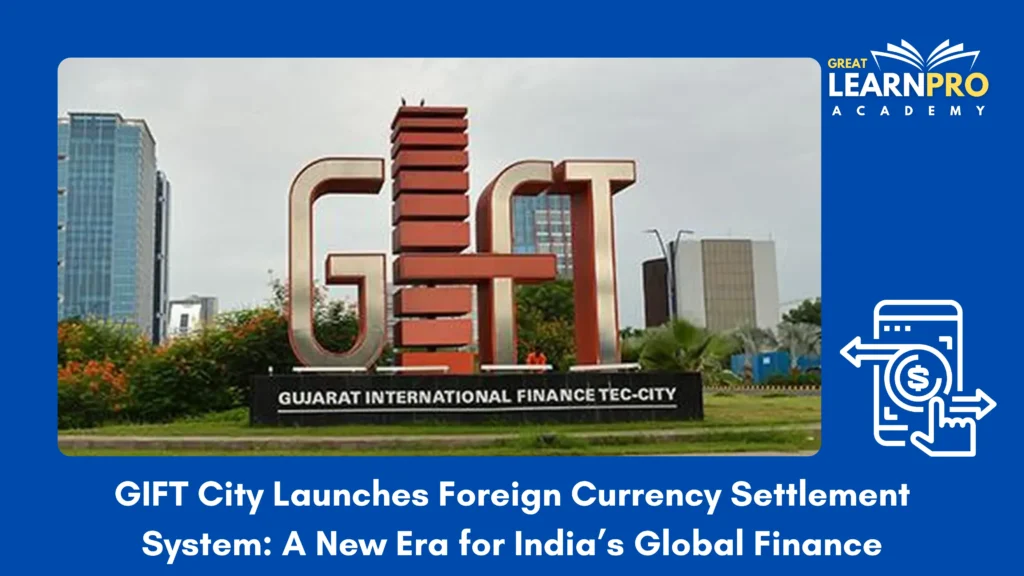GIFT City, or the Gujarat International Finance Tec-City, represents one of India’s most ambitious attempts to create a world-class international financial hub. Situated between Ahmedabad and Gandhinagar in Gujarat, GIFT City was envisioned as a futuristic business district that integrates cutting-edge technology, advanced infrastructure, and a globally competitive regulatory framework. The city aims to place India on the global financial map, similar to hubs such as Singapore, Dubai, and London.

Concept and Infrastructure
GIFT City is designed as an integrated ecosystem that combines an International Financial Services Centre (IFSC), a Special Economic Zone (SEZ), and a Domestic Tariff Area (DTA). Spanning around 886 acres, it includes a mix of commercial, residential, and institutional spaces, designed around the principle of “walk-to-work.”
It is India’s first smart city with highly advanced urban planning features including an underground utility tunnel, a district cooling system, an automated waste collection network, and robust ICT infrastructure. Beyond these technological advances, the IFSC within GIFT City operates under the International Financial Services Centres Authority (IFSCA), which provides a globally aligned regulatory environment for cross-border financial transactions and services.
The goal of GIFT City is not merely to be an infrastructural marvel but to serve as India’s gateway to international financial markets attracting global banks, fintechs, insurance companies, and asset managers to operate within a streamlined and business-friendly ecosystem.
The FCSS System: A New Era of Financial Settlement
Understanding FCSS
The Foreign Currency Settlement System (FCSS), recently launched at GIFT IFSC, marks a major milestone in India’s financial infrastructure. It allows participating banks and financial institutions within GIFT City to settle foreign currency transactions locally, in real-time or near real-time, without routing payments through overseas correspondent banks.
Earlier, every international transaction carried out in GIFT IFSC had to pass through global correspondent networks often taking 36 to 48 hours for final settlement. This not only delayed cross-border trade but also involved higher costs and exposure to operational and liquidity risks. The FCSS aims to resolve these inefficiencies by creating an independent and domestic settlement mechanism for foreign currency transactions, starting with the U.S. dollar and later expanding to other currencies.
How the FCSS Works
The FCSS is regulated under the Payment and Settlement Systems Act, 2007 and operates under the supervision of the IFSCA. The system is managed by CCIL IFSC Ltd., a subsidiary of the Clearing Corporation of India Ltd. Initially, Standard Chartered Bank has been designated as the settlement bank for U.S. dollar transactions.
Under this system, banks operating in the GIFT IFSC maintain local settlement accounts for foreign currencies. This eliminates the need for traditional nostro and vostro accounts held abroad and reduces dependence on overseas banking intermediaries. As a result, settlements can occur almost instantly, drastically improving the liquidity position and cost efficiency of institutions operating within the IFSC.
By facilitating direct local settlement, the FCSS strengthens India’s capability to handle global capital flows more efficiently and enhances the country’s stature as a global financial hub.
Strategic Importance
The introduction of FCSS carries wide-ranging economic and strategic benefits:
- Enhanced Global Competitiveness: GIFT IFSC now joins the ranks of financial hubs like Hong Kong and Singapore that have in-house foreign currency settlement systems. This makes India a more attractive destination for international banks, investment funds, and trading entities.
- Reduced Transaction Costs and Risks: Localized settlement eliminates the layers of correspondent banking, reducing both time and cost while minimizing credit and counterparty risks.
- Operational Efficiency: Real-time or near real-time settlements improve cash flow management and enable quicker transaction cycles for companies engaged in trade, investment, and finance.
- Stronger Regulatory Oversight: Since the FCSS operates within India’s legal and regulatory framework, it ensures compliance, transparency, and better monitoring of cross-border transactions, reducing risks associated with money laundering or regulatory arbitrage.
- Economic Impact: Efficient settlement systems improve investor confidence, attract global capital, and support India’s objective of expanding its share in international financial services. The FCSS is expected to act as a magnet for multinational corporations, fintechs, and global investors to establish operations in GIFT City.
Challenges Ahead
While the FCSS promises efficiency and global competitiveness, its long-term success will depend on several key factors.
- Scalability and Multi-Currency Expansion: Currently limited to the U.S. dollar, the system will need to expand to handle other major currencies like the euro, yen, and pound sterling.
- Adoption by Financial Institutions: The success of the system will rely on active participation by banks and corporates; a slow adoption rate could limit its impact.
- Technological Resilience: Maintaining a secure, resilient, and high-capacity infrastructure will be crucial to handle large volumes of high-value international transactions.
- Global Recognition: For the FCSS to be truly effective, it must gain credibility among international institutions, ensuring that settlements through GIFT IFSC are accepted globally as legally and financially robust.
Conclusion
GIFT City embodies India’s vision to establish itself as a global financial powerhouse. With its world-class infrastructure, innovative regulatory environment, and digital ecosystem, it offers a fertile ground for international financial operations. The launch of the Foreign Currency Settlement System (FCSS) is a transformative step in that direction.
By localizing foreign currency settlements, FCSS reduces costs, enhances liquidity, and accelerates transaction speed all while strengthening India’s control and oversight over cross-border payments. As the system evolves to handle multiple currencies and broader participation, it has the potential to redefine India’s position in global finance, paving the way for a more resilient and globally integrated economy.
Sources:
- https://m.economictimes.com/nri/invest/sitharaman-launches-foreign-currency-settlement-system-in-gift-city/articleshow/124355652.cms/?utm_
- https://giftgujarat.in/infrastructure/city-command?utm_
- https://cfo.economictimes.indiatimes.com/news/policy/global-fintech-fest-fm-sitharaman-unveils-foreign-currency-settlement-system-in-gift-city/124357962?utm_
- https://www.telegraphindia.com/business/nirmala-sitharaman-launches-real-time-foreign-currency-settlement-system-at-gift-city-prnt/cid/2126689?utm_
More Current affairs: https://learnproacademy.in/updates/
